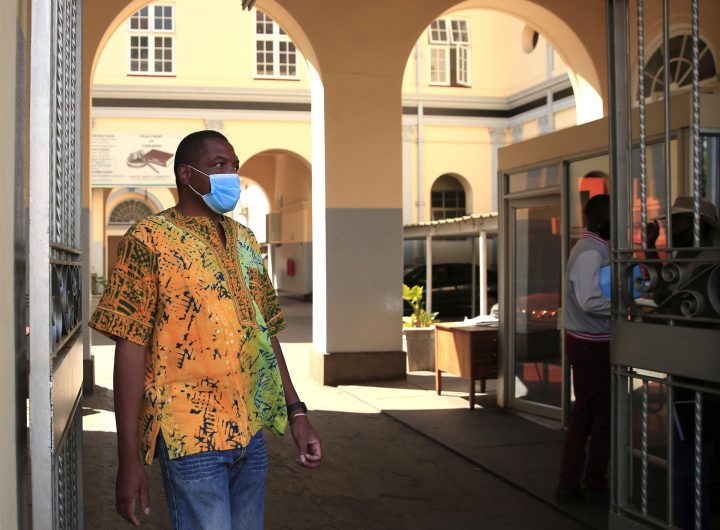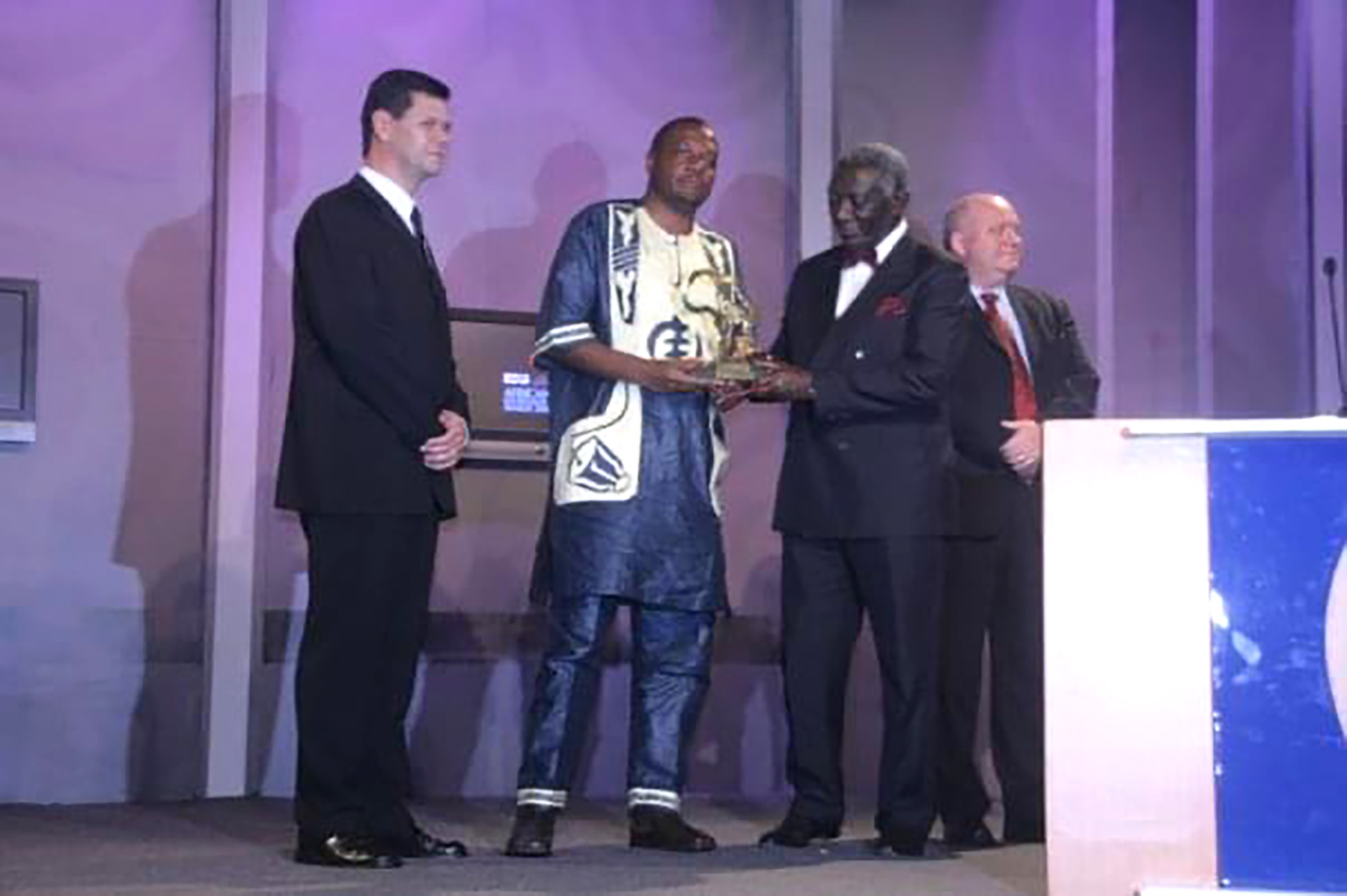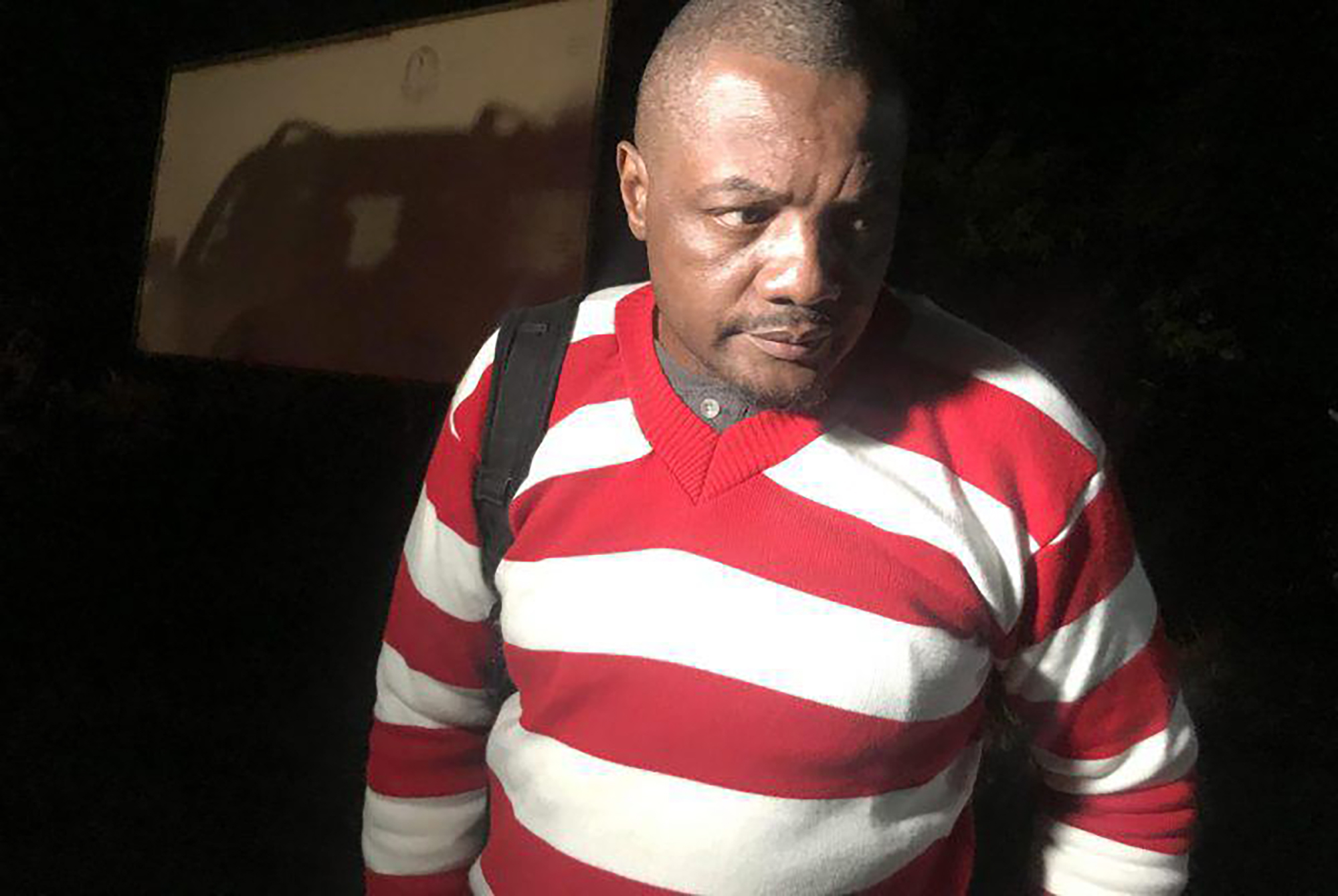DAILY MAVERICK 168
Interviewing Hopewell Chin’ono: ‘My arrest was meant to put the fear of God into other journalists’

Award-winning freelance journalist and documentary filmmaker Hopewell Chin’ono, 49, put the spotlight on human rights transgressions in Zimbabwe – under President Emmerson Mnangagwa’s watch – after being ambushed at his Harare home and forced to spend 45 days behind bars.
First published in DAILY MAVERICK 168
You filmed your arrest on 20 July and posted your last tweet: “They are breaking into my home. Alert the world!” Describe the buildup.
State agents came to my house. I called my lawyers and they said they should show a warrant of arrest. If not, don’t open the doors. I asked them for a warrant, they didn’t have one. I said I would not open until my lawyers arrive. I realised they were going to break into my home. I heard them discussing things – they got a phone call instructing them to break in. I realised I must record it. I live-streamed on Facebook their entry into my bedroom. They first broke my dining room sliding door – four men with AK47s, two from intelligence services and two police officers. They took my phone, but didn’t realise they were being live-streamed. They still have the phone.
After Emmerson Mnangagwa came to power in 2017, you were among those who urged the country to give him a chance to implement promised reforms. What changed?
Mnangagwa came in on a reform ticket. Even MDC decided to give him a chance. (Morgan) Tsvangirai refused to call it a coup. We thought this was an opportune moment to turn around the country. Elections were held on 31 July 2018. By the 1st, after six unarmed protesting citizens were killed, I realised things were going wrong – it was the same old regime, with no desire to change. We realised that promises were just promises. Mnangagwa was not reforming; he was not interested in the constitution of the country. As I had urged that he be given a chance, I had a moral obligation to call him out.
One can understand the desire for hope after being freed from Robert Mugabe’s stranglehold. Was there a time that you looked up to him?
Most people of my age saw Mugabe as a liberation hero. I was born in 1971 and he came to power in 1980. We benefited from the early policies – education was good, health was available and Mugabe was expanding hospitals and education. We thought our liberators would give us the right to speak out. But Zanu-PF became worse… nothing was being built. Right now, we don’t have working government hospitals, yet over 95% of our people rely on state healthcare. The decay is due to incompetence, failure to comply with the constitution, looting of funds and plundering of resources. Zimbabwe was among the wealthiest countries in the region; now we have nothing to show for it. Our hopes were dashed again with Mnangagwa, but this time it didn’t take long to realise. The level of looting and plundering is shocking, not even seen under Mugabe’s rule, where it took 15 years to go pear-shaped.

Zimbabwean journalist Hopewell Chin’ono receives the 2008 CNN African Journalist of the Year award from former Ghanaian president John Kufuor. (Photo supplied)
What got you through 45 days in jail?
Some sympathetic prison guards would show me tweets on their phones – from governments, citizens, others… that gave me strength to carry on, not break my spirit. I saw people fighting in my corner; I had no reason to feel broken. The fact the global media was on the story, throughout 45 days in prison, gave me strength. We realised the regime was under pressure; churches were issuing statements asking why journalists who were exposing corruption were being arrested while looters were roaming streets. I realised I was not alone and this gave me strength.
You were charged with incitement to commit public violence – using social media? What is your answer?
They were fictitious charges. The state is still investigating, which is why they have no trial date. They had four tweets as evidence, yet I never talk about violence. I talk about anti-corruption. The protest was called by my co-accused, opposition party leader Jacob Ngarivhume. I have not disowned the tweets. They have no case. They wished to incarcerate us for exposing corruption. The president was upset that his family was involved in exposés… that is why they came after me. Our job is to report the news, expose corruption. It is not political as the government claims. Prior to my arrest, Zanu-PF spokesperson Patrick Chinamasa had warned me in an online video (statement) to stop what I was doing, saying I was unscrupulous and tarnishing the image of the president and accusing his son of being involved.
Before your arrest, investigative journalists uncovered a US$60m Covid-19 medical supplies scandal involving health minister Obadiah Moyo, who was subsequently fired. What was your role?
A journalist wrote a story and I realised something was going on. He gave me a document signed by the finance permanent secretary. I engaged with the permanent secretary on Twitter. When I dropped the document on Twitter, the secretary disappeared. I did my own investigations. The company was registered in Dubai, but it was a bogus company. I looked in Hungary, where R2m had been wired, and again it was a shelf company. I challenged them. I called for explanations, found links. I did a lot of digging, also in Namibia. A shelf company had ordered goods from China at the cost of US$380, yet the Zim taxpayer was billed US$68,000. I posted the evidence on Facebook and Twitter for concerned citizens to see. People started engaging in a campaign to get the health minister fired. We stopped US$60m looting of funds. We exposed them… They were furious.
Other journalists were involved. Are you concerned for local journalists who don’t have the same visibility?
My arrest was meant to put the fear of God into other journalists – a warning that this is what happens if you tarnish the image of the president. I am worried about journalists: there is a history of abductions, there is fear.
I collaborated extensively with journalist Mduduzi Mathuthu (@mathuthu, @zimlife). He is on the run. They abducted his nephew. He was tortured and ended up needing dialysis. That is why it is important for the international community to make a noise and ensure journalists are not intimidated.
Explain the symbolism of wearing the red and white striped prison jersey on your exit from Chikurubi maximum security prison?
Prison inmates are supposed to have uniforms. Part of it is the red and white jersey. We had to get our own brought into prison. Zimbabweans started buying them and wearing them as a symbol of oppression. I wear the jersey when I go to court and in support of other political prisoners.

Hopewell Chin’ono after his release from prison. (Photo: Frank Chikowore)
How would you describe the status of media freedom in Zimbabwe today?
If you report on press statements, fine, but if you report on corruption, you end up being harassed. It is worse under Mnangagwa – Mugabe had a certain subtlety, he understood sensitivities. Mnangagwa does not care.
What is your view of South Africa’s mediation efforts?
It was South African citizens and the media, not the government, who put on a lot of pressure, which became unbearable for the Zim government.
Why should South Africans be concerned about what is going on in your country?
Besides the geographical reality of being neighbours, every Zimbabwean will find their way to SA if they can’t feed their families. Because of that, South Africans should be concerned about life’s realities in Zimbabwe, because misgovernance ends up with citizens going to SA, and these are the same elements that trigger xenophobia – they feel Zimbabweans are taking their jobs, but you can’t blame Zimbabweans for that.
They come because of the tragic failure of healthcare, of governance, which is putting pressure on SA. The SA government has tried the carrot, now they need to use the stick. SA needs to ask:
“Why are you failing to look after your people’s needs? Why are we looking after your people when you have a country with so much wealth?” Zimbabwe is not in the state it is because of sanctions, but because of looting.
The opposition is calling for a multiparty transitional mechanism to govern Zimbabwe and prepare for new elections. Is there another way?
It is a rogue regime. The start is for the government to follow the constitution… Perhaps we need an outside hand to help us to have free and fair elections. SADC is corrupt and weak. SA would have more leverage, even more than the UN. As it is shouldering the economic burden, it has a moral right to get Zimbabwe to act.
How strong is the G40?
They are not that strong. Whoever is in control of the military, has the stronger hand.
What stands in the way of the MDC settling its internal differences to form a united opposition?
Failure to lead – they got 2.6 million votes: surely they could unite a country. It is a huge disappointment. Citizens are equally frustrated with these weaknesses. We require leadership and unity of purpose. The opposition should unite and focus on the issue of making the country right.
Why did you become a documentary filmmaker and journalist?
I loved writing, and then when I did my masters at City University in London, majoring in radio, I won a scholarship to study film in England and realised there was no professional doccie filmmaking in Zimbabwe – only foreigners who come here briefly. I realised there was no record of our own past. When I got the scholarship I decided to study documentary filmmaking.
What journalism/filmmaking are you most proud of?
The ability to shine a light in the darkness. People would not have known the level of abuse of Covid-19 funds if journalists had not investigated. An HIV-Aids documentary I made in 2007 won awards, but more importantly, it helped the world to understand the situation of HIV medication in Zim – Pain In My Heart (see video link below). It changed the playing fields and citizens started getting more help.
Would you define yourself as a journalist or a journalist-activist?
A journalist. We are human beings. Simply because I comment on issues that are affecting my country – access to healthcare, water and finding ways for people to lead a better life – if I am then labelled an activist, so be it.
What is the genesis of your Twitter handle, @daddyhope?D
It was a nickname given to me in high school – it just stuck.
In terms of the case against you, what happens next?
I am back in court on 19 October, waiting for the state to give us a trial date – but we have been waiting since July.
What is your dream for your country?
I would like to see a better Zimbabwe; for all citizens to have the same opportunities, get the kind of support that ordinarily any state or government gives to its people, such as the right to clean, running water. I hope it can be achieved in my lifetime. DM
Disclosure: Heard and Chin’ono were classmates in the 2010 Nieman year. This Q&A has been edited for brevity.


















Comments - Please login in order to comment.